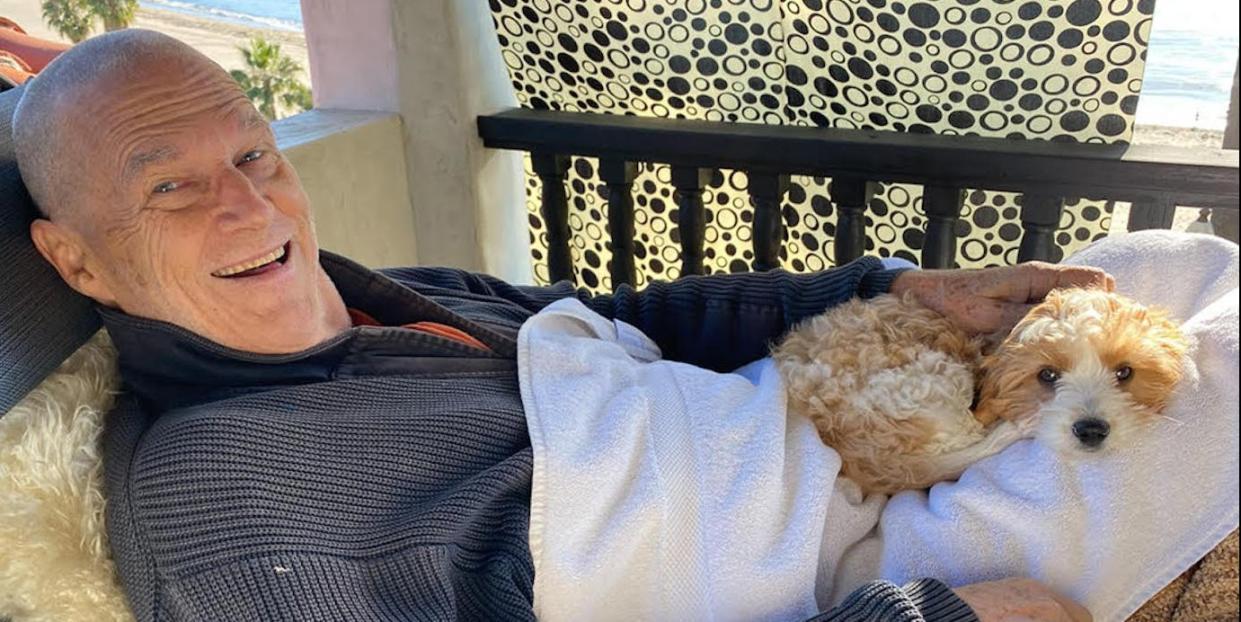Jeff Bridges Spent 5 Weeks in the Hospital After Contracting COVID-19 During Chemo Treatments

- Oops!Something went wrong.Please try again later.
Jeff Bridges, 71, revealed that he contracted COVID-19 in January following chemotherapy appointments to treat his lymphoma.
The Big Lebowski star said his cancer fight has been “a piece of cake” compared to COVID-19 after spending five weeks in the hospital.
Bridges has recovered from COVID-19—and is currently in remission from his lymphoma.
After being diagnosed with lymphoma last year, Jeff Bridges underwent chemotherapy to treat his cancer, and the actor revealed he contracted COVID-19 in January during one of his chemotherapy appointments.
Bridges said he received a letter from the clinic stating he may have been exposed to COVID-19. "Soon after, my wife Sue and I share an ambulance to the ICU. We both got the ’rona," he wrote in a blog post on his website.
The Big Lebowski star said he spent five weeks in the hospital, while his wife was there for five days. “The reason I’m there so long is because my immune system is shot from the chemo,” he said. “My dance with COVID makes my cancer look like a piece of cake.”
He said he had “moments of tremendous pain” during his “brush with mortality,” but his experience with COVID-19 opened his eyes to the gift of life that is “brief and beautiful.” After needing oxygen assistance and physical therapy to regain his strength, Bridges said he's feeling much better several months after his diagnosis and was able to walk his daughter down the aisle. He's also vaccinated.
f e e l I n’ b e t t e r - but COVID kicked my ass.
Visit https://t.co/GcCI5SkF65 for an update. pic.twitter.com/GALIxu6cV4— Jeff Bridges (@TheJeffBridges) September 13, 2021
Bridges shared even more good news in his health update—the actor is currently in remission from lymphoma. “The 9” x 12” mass has shrunk down to the size of a marble,” he said.
Bridges first revealed he was diagnosed with lymphoma in October 2020. “As the Dude would say... New S**T has come to light. I have been diagnosed with lymphoma,” he wrote on Twitter and Instagram. “Although it is a serious disease, I feel fortunate that I have a great team of doctors and the prognosis is good.”
The actor remained in good spirits about his prognosis, but it's understandable that you might have questions about lymphoma, its symptoms, and what treatment looks like. Ahead, doctors explain what you need to know about this form of cancer.
What is lymphoma, exactly?
Lymphoma is cancer that begins to form in immune system cells, according to the National Cancer Institute (NCI). There are many forms of lymphoma, but they can generally be broken into two basic categories: Hodgkin lymphoma, which is determined by the presence of a type of cell called the Reed-Sternberg cell, and non-Hodgkin lymphomas, which includes a large group of cancers of immune system cells.
While Hodgkin and non-Hodgkin lymphomas are both cancers of the lymphatic system (the network of tissues and organs that eliminate toxins and waste from your body), they “are two totally different diseases,” says Jack Jacoub, M.D., medical oncologist and medical director of MemorialCare Cancer Institute at Orange Coast Medical Center in Fountain Valley, Calif. That said, “they have a lot of similarities.”
Both lymphomas can happen in children and adults, and the prognosis and treatment usually depend on the type of cancer and how far it has progressed.
What are the symptoms of lymphoma?
The symptoms are slightly different, depending on the type of lymphoma. These are the main symptoms of Hodgkin lymphoma, according to the American Cancer Society (ACS):
An enlarged lymph node, that appears as a lump in the neck, under the arm, or in the groin. The lump might get bigger over time, or new lumps might appear near it or in other parts of the body.
Fever
Drenching night sweats
Unexplained weight loss
Itching skin
Fatigue
Loss of appetite
Cough
Trouble breathing
Chest pain
The ACS says the following are the main symptoms of non-Hodgkin lymphoma:
Enlarged lymph nodes
Chills
Weight loss
Fatigue (feeling very tired)
Swollen abdomen (belly)
Feeling full after only a small amount of food
Chest pain or pressure
Shortness of breath or cough
Severe or frequent infections
Easy bruising or bleeding
Fever
Drenching night sweats
Unexplained weight loss
In general, enlarged lymph nodes are one of the most common symptoms of lymphoma, says David Bond, M.D., a hematologist who specializes in lymphoma at The Ohio State University Comprehensive Cancer Center - Arthur G. James Cancer Hospital and Richard J. Solove Research Institute. “For some types of lymphoma which tend to be slower growing, the diagnosis may be made incidentally during the course of care or testing for other medical conditions,” he says.
How is lymphoma treated?
In general, yes. “Hodgkin lymphoma is a highly curable illness—even in the advanced stages it can be cured,” Dr. Jacoub says. With non-Hodgkin lymphomas, patients can be cured, but it’s often more likely that someone will be put into remission (meaning their symptoms are partially or completely gone), he says. “People can live decades after a diagnosis,” Dr. Jacoub says.
Treatment varies depending on the type of lymphoma a patient has but chemotherapy and radiation are a typical course of action, the ACS says. “There has been remarkable progress in terms of new treatments, which are available for many specific types of lymphoma,” Dr. Bond says.
Lymphoma is still a rare form of cancer, which is why it’s important to be treated by a specialist, according to Henry Fung, M.D., chair of the Department of Bone Marrow Transplant and Cellular Therapies at Fox Chase Cancer Center. “They will make an accurate diagnosis, staging, and formulate a best individualized plan for the patient,” he says.
Go here to join Prevention Premium (our best value, all-access plan), subscribe to the magazine, or get digital-only access.
You Might Also Like

